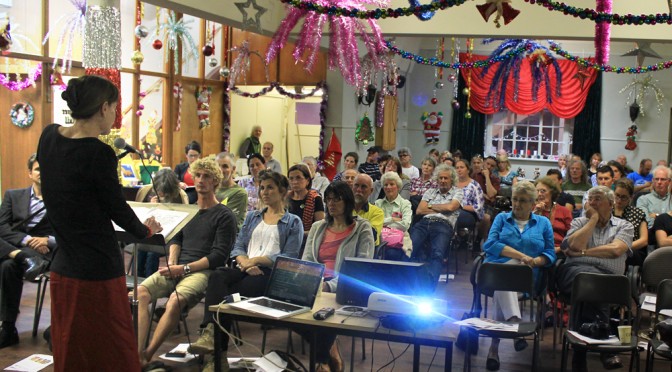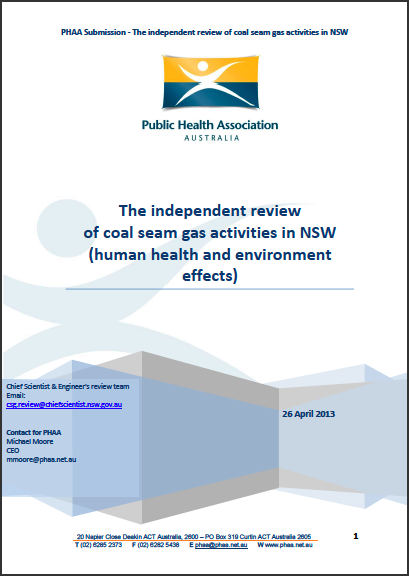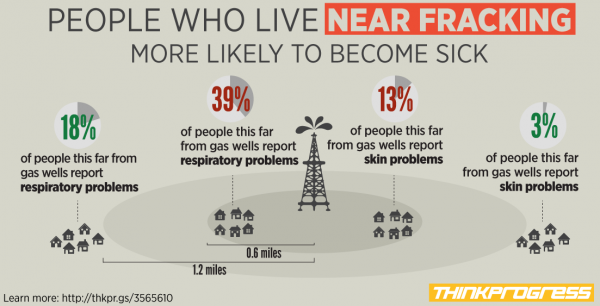The Medical Journal of Australia writes:
“Summary
• If unconventional gas development (UGD) continues to expand in Australia, the potential health and environmental impacts should be adequately addressed and preventive public health measures should be implemented.
• The United States has embraced UGD and has decades of experience that could be beneficial to Australia as stakeholders debate the potential benefits and harms of the technique.
• Additional research on the health impacts of UGD is necessary. Baseline and trend morbidity and mortality data need to be collected to assess changes in population health over time. To date, few health or epidemiological studies have been conducted, so it remains difficult to assess actual health outcomes.
• In the absence of scientific consensus, there are two possible risks: failing to develop unconventional natural gas when the harms are manageable; or developing it when the harms are substantial. Many government bodies around the world have chosen to minimise the risk of the latter until the impacts of UGD are better understood.
• Policies should be informed by empirical evidence based on actual experience rather than assurance of best practices. There is a strong rationale for precautionary measures based on the health and environmental risks identified in the scientific literature.”
» Read more: www.mja.com.au
Report on fracking from Public Health Association Australia
Here is a report that has weight and authority as it is coming from the Public Health Association Australia. After reading the report, it becomes even more scary and horrendous that our elected leaders, Labor as well as the Liberal / Coalition, aren’t listening to this kind of facts and evidence even when they are delivered by The Public Health Association of Australia Incorporated (PHAA) which is recognised as the principal non-government organisation for public health in Australia and which works to promote the health and well-being of all Australians.
The report is from 26 April 2013 and is called: ‘The independent review of coal seam gas activities in NSW’ (human health and environment effects).
An excerpt from the first chapter:
Overview of health effects – a framework and summary
“The health consequences of unconventional gas extraction might be framed in a classical medical primary, secondary and tertiary effects manner. Primary are the direct, secondary the indirect, systemic effects and tertiary the flow on effects.
• Primary / direct effect on air quality | Cause: Methane, volatile hydrocarbons
• Primary / direct effect on water quality (surface and underground) | Cause: Drilling and fracking chemicals. Volatile hydrocarbons and methane from coal. Salts. Heavy / radioactive metals from coal and rock
• Primary / direct effect on water availability | Cause: Use of water in production. Inadvertent linkage of aquifers and water loss
• Primary / direct effect on soil quality | Cause: Chemical leakage / spillage from production or waste water
• Primary / direct effect on seismic activity | Cause: From fracking and pressure changes below ground
• Primary / direct effect on erosion | Cause: Increased travel over roads and country
• Primary / direct effect on spread of weeds | Cause: From increased vehicle access
Secondary / follow on effects
(Note: these effects arise from several primary effects synergistically)
• Compromise of agricultural land
• Adverse effects on livestock
• Adverse effects on ecosystems and the biosphere
• No reduction in GHG emissions and continued global warming
Tertiary / Flow-on effects on well-being and health
• Conflict in mining affected communities
• Loss of control over access to property
• Reduced water availability
• Fears of loss of land, livelihood and community
• Actual loss of agricultural productivity impacting food security for Australia
• Loss of wellbeing due to concerns about health
• Psychological effects from several of the above sources
Examples of such effects in Australia include:
• Benzene, xylene and toluene were found in monitoring water bores. Connectivity and cross contamination of the Springbok aquifer by the Walloons coal measure was demonstrated post fracking at Myrtle 3.
• There was widespread habitat destruction after a spill in the Pilliga forest.
• There are flammable water bores at Kogan and gas fuelled bush fires at Dalby.
• The Condamine River is bubbling methane along several kilometres of its length.
• There is a cluster of ill health amongst people living in the gas fields near Tara and Kogan. Their symptoms are similar to what have been reported in gas fields in the US. These include daily headaches, epistaxis, rashes after bathing, nausea, eye irritation, metallic taste and respiratory problems.”
» Public Health Association Australia – 26 April 2013:
Right-click to download the report (PDF): ‘The independent review of coal seam gas activities in NSW’ (human health and environment effects)
» New York:
A Public Health Review of High Volume Hydraulic Fracturing for Shale Gas Development
» Lancashire:
Health & Fracking – The impacts & opportunity costs
“People who live in fracking zones appear to suffer a higher rate of heart conditions and neurological illnesses, according to new research. Although the US study was unable to determine a specific reason, it suggests there may be a link between drilling and ill health, scientists said.”
» Readersupportednews.org – 14 August 2015:
People Who Live Near Fracking Sites Suffer Higher Rates of Heart Conditions and Neurological Illnesses, Says Research
By Tom Bawden, The Independent
State government inquiry submissions
Victoria, August 2015
» Doctors for Environment Australia (PDF 580.83 KB)
http://www.parliament.vic.gov.au/images/stories/committees/EPC/Submission_416_-_Doctors_for_Environment_Australia_.pdf
Barwon Paediatricans (PDF 500.07 KB)
http://www.parliament.vic.gov.au/images/stories/committees/EPC/Submission_864_-_Barwon_Paediatricans.pdf
A youtube video about fugitive emissions – and one family’s exposure to them
Evaluation of 400 peer-reviewed studies
Physicians Scientists & Engineers for Healthy Energy in New York, USA, released a working paper analysis, statistical evaluation of the approximately 400 peer-reviewed studies to date on the impacts of shale gas development. In short, they examined what percentage of papers indicated risk/adverse impacts versus no indication of risk.
Key highlights include:
– 96% of all papers on health indicate risks/adverse health outcomes.
– 95% of all original research studies on air quality indicate elevated concentrations of air pollutants.
– 72% of original research studies on water quality indicate contamination
– And there is a recent explosion in the number of peer-reviewed publications, with approximately 73% of all available peer-reviewed papers published in the past 24 months and a current average of one paper published each day.
» Toward an understanding of the environmental and public health impacts of shale gas development: an analysis of the peer reviewed scientific literature, 2009-2014
American health professionals release major scientific document on fracking
Health experts and scientific researchers with Concerned Health Professionals of New York held a press conference in Albany on 10 July 2014 to release a major new compilation – a compendium – of the scientific, medical and media findings demonstrating risks and harms of fracking.
The 70-page document is systematically organised in a manner accessible to public officials, researchers, journalists and the public at large and should serve an important role in the ongoing public and policy dialogue.
» Download the report as a pdf: Compendium of scientific, medical, and media findings demonstrating risks and harms of fracking (unconventional gas and oil extraction)
» Article: Health Impacts of Fracking: Read about what is NOT happening in PA
In the United States, doctors, nurses, researchers and other health and public health professionals sent an important letter to their president on 20 February 2014:
President Obama
The White House
1600 Pennsylvania Avenue, NW
Washington, D.C. 20500February 20, 2014
Dear President Obama,
Enclosed please find letters from more than 1,000 health professionals nationwide calling for a stop to fracking.
Fracking operations often use toxic chemicals, generate millions of gallons of wastewater that can be laced with cancer-causing and even radioactive material, release asthma-inducing volatile organic compounds (VOCs) and other harmful pollutants into the air we breathe, and contribute significantly to global warming.
Given this toll of damage, these health professionals assert the prudent and precautionary response would be to stop fracking, and are calling for immediate action from your administration and other elected officials to protect public health.
Sincerely,
Courtney Abrams
Clean Water Program Director
Environment America Research & Policy Center
Let’s Protect America’s Health from Fracking
February 20, 21014
Dear President Obama,As doctors, nurses, researchers and other health and public health professionals, we are deeply concerned about high-volume horizontal hydraulic fracturing (“fracking”) and its growing threats to public health and the environment. Fracking operations (i.e., the full cycle of extraction operations, not solely the fracturing technique) inject complex mixes of toxic chemicals deep underground; generate millions of gallons of wastewater that is often laced with radioactive, cancer- and other disease-causing toxicants; release toxic chemicals into the air we breathe, and contribute significantly to climate change.
Each of these threats increasingly takes its toll, including:
• Fracking operations have contaminated drinking water sources from Pennsylvania to New Mexico. Leaks and spills of fracturing fluid – which often contain known carcinogens (e.g. benzene) and endocrine-disrupting chemicals – have polluted rivers and streams. Other contaminants have flowed into residential wells. And fracking wastewater – often containing heavy metals (e.g. lead, arsenic) and radioactive materials (e.g. radon, uranium) – has leached from hundreds of waste pits into groundwater.
• Air contaminants released from fracking operations include volatile organic compounds (VOCs); some are carcinogenic, and some damage the liver, kidneys and central nervous system. Researchers at the University of Colorado School of Public Health found that people living within a half-mile of gas fracking wells had a higher excess lifetime risk of developing cancer than people living farther away.
• There are a growing number of documented cases of individuals suffering acute and chronic health effects while living near fracking operations – including nausea, rashes, dizziness, headaches and nose bleeds. Physicians reviewing medical records in Pennsylvania have called these illnesses “the tip of the iceberg” of fracking impacts on health; and
• Fracking operations release significant volumes of global warming pollution. Methane, which scientists now say is 86 times more potent than carbon as a greenhouse gas over 20 years, is released at oil and gas fracking wells, and also during the processing, transmission, and distribution of gas. Global warming presents a major threat to human health via heat waves, extreme weather events, flooding, water contamination, sea level rise, expansion of insect-borne diseases, worsening air quality, crop damage, and social instability and conflict.
Given this toll of damage, the prudent and precautionary response would be to stop fracking.
Instead, the oil and gas industry is seeking to expand fracking at a frenzied pace, even into areas that provide drinking water for millions of Americans.
In light of this, we urge you to take two immediate steps to protect families and communities on the frontlines of fracking: First, call for closing the loopholes that exempt fracking from key provisions of our nation’s bedrock environmental and public health laws, including the Clean Water Act, Clean Air Act, and hazardous waste laws. Second, heed the recommendation of your administration’s fracking advisory committee and declare sensitive areas – including places that provide drinking water for millions of Americans – as “off-limits” to fracking.
Left unchecked, high-volume horizontal hydraulic fracturing could soon emerge as one of the greatest environmental health threats we have faced in a generation. We urge you to take action now.
Sincerely,
More information
» Ecowatch.com:
1,000+ Health Care Professionals Call on President Obama to Halt Fracking
New York: Letters to Governor Cuomo
Since Governor Cuomo’s inauguration in January 2010, hundreds of health professionals and organizations from across the state of New York have called on his administration to conduct an independent, comprehensive Health Impact Assessment.
» Concerned Health Professionals of New York:
www.concernedhealthny.org
Based on peer-reviewed scientific research, Dr. Larysa Dyrszka gave a presentation in New York on 12 August 2014 about the health impacts of fracking compressor stations (video 3 of 5)
Published on youtube.com on 26 August 2014
» Climate News Network – 19 August 2014:
Health alert over fracking’s chemical cocktails
Scientists in the US have established that some chemicals used in the controversial process of fracking to extract gas and oil could represent health and environmental hazards.
Warning from doctors: Protect yourselves from gas mining
“The new Coal Seam Gas gold rush shouldn’t be allowed to endanger the health of generations of Australians”
Dr Jacinta Morahan, Doctors for the Environment
Common Dreams – 10 September 2014:
Research Shows Frightening Correlation Between Fracking and Rates of Illness
Respiratory and skin issues likely caused by air or groundwater contamination as a result of natural gas drilling, says new study
By Lauren McCauley
Medical Journal of Australia – March 2014:
Harms unknown: health uncertainties cast doubt on the role of unconventional gas in Australia’s energy future
By Alicia Coram, Jeremy Moss and Grant Blashki
Business Insider – 3 March 2014:
Australian Doctors Have Raised A Health Red Flag Over Coal Seam Gas Developments
Uncertainties about the health implications of unconventional gas production should be a factor in putting the brakes on the industry in Australia, say researchers in the Medical Journal of Australia.
What will it take to protect the health and well-being of the local residents and environment from fracking and gas mining? This question was investigated at a public meeting in Geelong, Australia, on 12 December 2013.
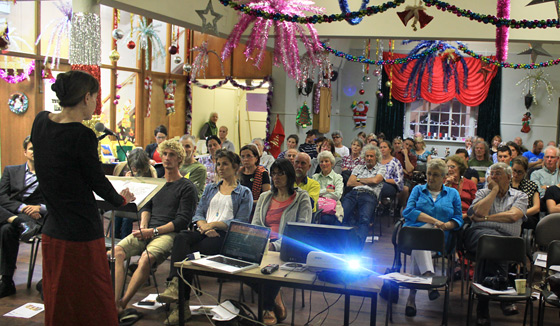
“People like us who speak up about these environmental issues are labelled as somehow ‘radical’. But human health relies on the maintainance of a healthy environment, clean drinking water, secure food production, and supporting community and family life, and there is nothing radical about that sentiment. Any new development should ensure human health is protected, and I think any reasonable human being would agree with that. So the new Coal Seam Gas gold rush shouldn’t be allowed to endanger the health of generations of Australians.”
Dr Jacinta Morahan, Doctors for the Environment

“I think that this issue is looming up to be one of the biggest environmental issues in Victoria that we have seen. Not perhaps as large as global warming – however, it has got huge impact in all sorts of directions. I think the only way that we will be able to combat it is by the city people and country people working together. Both will have different concerns, different points of view, but unless city and country work together, I’m sure that we will see the [gas mining] come to some places.”
Joan Lindros, Geelong Environment Council
On 12 December 2013, a public meeting in Geelong featured expert speakers who looked at the risks associated with unconventional gas mining and ‘fracking’ in the Geelong and Surf Coast area. The meeting was attended by 80 people – citizens of Geelong as well as farmers from the region.
‘Fracking’ is the controversial process of injecting high pressure fluid into the ground – including toxic chemicals which make their way into the water table – to fracture rocks and release natural gas.
For those who missed this opportunity to learn about the implications of an onshore gas industry in the region, audio recordings of the presentations can be listened to below.
Call for council to ban fracking
Will the Council of City of Greater Geelong get its act together and call for a permanent ban on gas mining in Victoria just like the neighbouring Surf Coast Council recently has done it?
This question was left unanswered at the public meeting on 12 December, since no councillors or representatives from the City Council had found the time to show up. The new mayor of Geelong, Darryn Lyons, has however stated in a sustainability survey conducted by The Sustainable Hour on 94.7 The Pulse during the election period in November 2013 that he is against fracking.
The Frack Free Geelong groups invite citizens who would like to take active part in the groups’ activities to a follow-up meeting at Geelong Trades Hall on Thursday 19 December at 6pm.
AUDIO RECORDING OF THE ENTIRE MEETING
Introduction
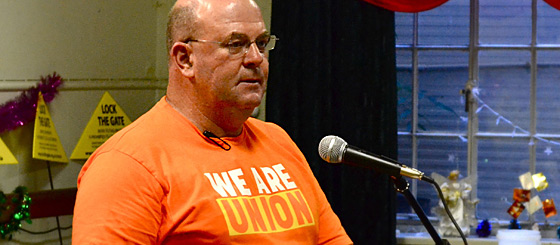
» To open or download this recording, right-click here: mp3-file (Mac: CTRL + click)
Tim Gooden from Trades Hall says welcome
Presentations
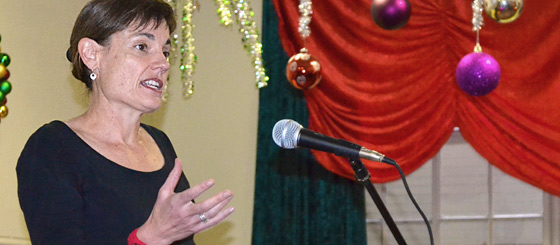
» mp3-file
Dr Jacinta Morahan from Doctors for the Environment
. . . . . . . . . . . . . . . . . . . . . . . . . . . . . . . . . . . . . . . . . . . . .
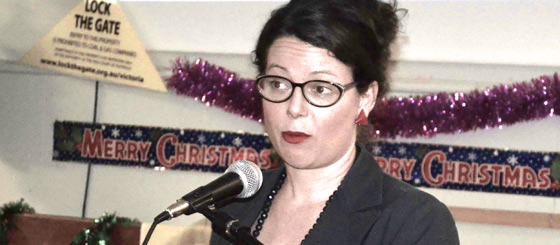
» mp3-file
Ariane Wilkinson from the Environment Defenders Office
. . . . . . . . . . . . . . . . . . . . . . . . . . . . . . . . . . . . . . . . . . . . .
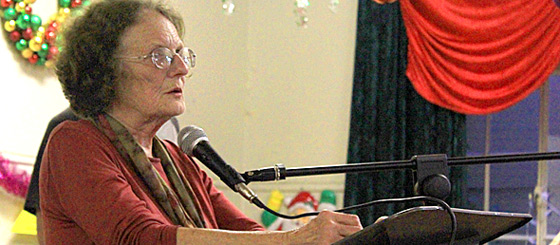
» mp3-file
Joan Lindros from Geelong Environment Council
. . . . . . . . . . . . . . . . . . . . . . . . . . . . . . . . . . . . . . . . . . . . .

» mp3-file
Cam Walker from Friends of the Earth Melbourne
After the presentations

» mp3-file
Mixed remarks from the speakers
. . . . . . . . . . . . . . . . . . . . . . . . . . . . . . . . . . . . . . . . . . . . .
» mp3-file
Comment about compromising water safety
. . . . . . . . . . . . . . . . . . . . . . . . . . . . . . . . . . . . . . . . . . . . .
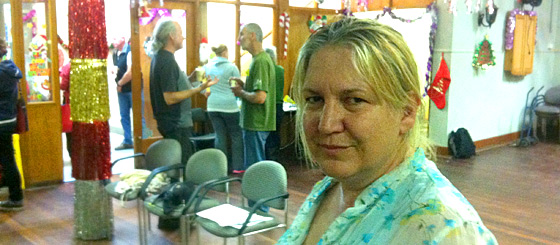
» mp3-file
Impressions and statements from the audience
. . . . . . . . . . . . . . . . . . . . . . . . . . . . . . . . . . . . . . . . . . . . .
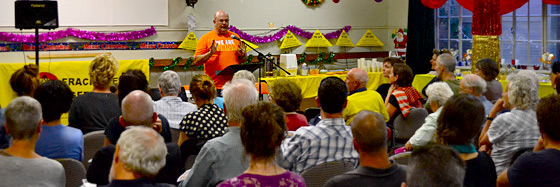
Tim Gooden about new anti-demonstration laws and the unions’ role
. . . . . . . . . . . . . . . . . . . . . . . . . . . . . . . . . . . . . . . . . . . . .

Closing remarks from three of the speakers, Dr Jacinta Morahan, Joan Lindros and Ariane Wilkinson
. . . . . . . . . . . . . . . . . . . . . . . . . . . . . . . . . . . . . . . . . . . . .
Closing remark from Cam Walker
This is the film which was shown at the meeting: ‘Gippsland Is Precious’ – a documentary about Coal Seam Gas mining
‘Gippsland Is Precious’ explores what is at stake for Victoria’s Gippsland region, and what communities and individuals can do when they unite.
“We’ve got a main industry of dairy, beef, and potatoes, the industry is worth billions over years, and it’s always been that way. We have very rich soils, and the most important thing of all is our water resources. Coal Seam Gas mining companies can drill within hundreds of meters of any water reserve or dam, so, look – it is just crucial: water is the link of life, and if we let these people in to destroy that for a short term profit and a few fly-in fly-out jobs, our community will just disperse and we will end up barren.”
Kieran Kennedy, mayor of South Gippsland, Victoria
Gasfield Free Kyogle
Published on youtube.com on 23 December 2013.
On 23 November 2013 the people of Kyogle, in northern NSW, Australia, came together for a moving ceremony to declare their region gasfield-free. Speakers included local and federal politicians, community members, and health experts.
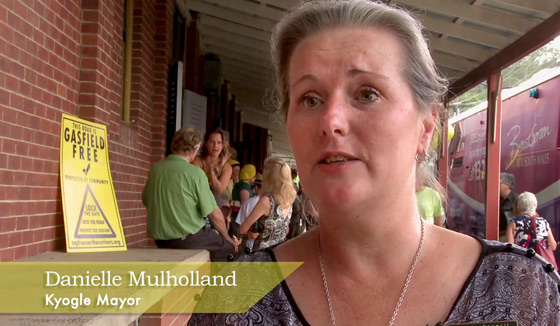
“We are seeing democracy in action. We are seeing people flocking to this event to say ‘We don’t want unconventional gas in our area. That is essentially what it comes down to. And as representatives of the people, we should be enforcing that position. So that is why I am here today.”
“They are afraid for the children, their grandchildrens’ futures. They are afraid for their health. Air. Farmland. Water. There are so many issues around Coal Seam Gas that are unresolved.”
“The chemicals in particular concern me – in terms of our groundwater. Because without water, we die. That is what it comes down to. Whether it be your cattle, whether it be your crops. Anything. We have talked today about the contamination of these things.”
“The state government has introduced a range of regulations which are the most stringent in Australia whilst at the same time we can acknowledge that governments of all persuasions have a poor track record of regulating industries when questionable promises of large sums of money flow into depleted government coffers.”
“I am proud to represent a community that stands up for social justice and is so committed to preserving its way of life that it demands to be heard.”
Danielle Mulholland, Mayor of Kyogle
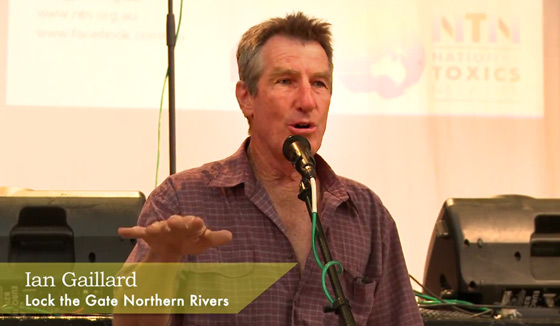
“Professor Anthony Ingraffea says 6 percent of the pipes fail immidiately. 60 percent fail after 20 years. And they all fail eventually. So when we get the spin from this industry telling us that it is all safe and we are looking after you, we know that that is lying. That is not true.”
Ian Gaillard, Lock the Gate Northern Rivers
Continue reading about the achievements of the Kyogle community:
Echo Netdaily – 25 November 2013:
Kyogle says it loudly and proudly: no CSG!
Kyogle declared itself a coal seam gas (CSG) free community over the weekend as more than 90 per cent of the local government area (LGA) handed in road declarations to Kyogle mayor Danielle Mulholland.
Article by Melissa Hargraves
Australian documentary ‘The Human Cost of Power’
Published on youtube.com on 10 October 2013.
The film explains about the health issues with hydraulic fracturing, fracking.
The fossil fuel air pollution causes climate change – which a majority of people dismiss as something which will happen some time in a distant future. But we don’t seem to talk about is that the pollution of coal, gas and oil also causes health issues – and deaths – here and now.
“83 percent of the Australian mining industry is foreign owned. So much of the income generated here is transferred offshore. The federal government annually spends 10 billion dollars on subsidies to the coal, gas and petroleum industries.”
Dr Mariann Lloyd-Smith
Dr Mariann Lloyd-Smith speaking at Kyogle NSW, Nov 2013
Dr Mariann Lloyd Smith, Senior Policy Advisor at the National Toxics Network, is an acknowledged international expert on toxicology. She gave a competent and insightful presentation Kyogle Gasfields-Free Community Celebrations, northern NSW, Australia, 23 November 2013, explaining the latest medical research relating to unconventional gasfields and human health. The video reccording of it goes for just under 20 minutes.
» Published on youtube.com on 3 December 2013.
Dig deeper
Friends of the Earth Melbourne:
» What’s happening with gas exploration in western Victoria?
Fossil Fuel Free Future:
» Why you should be concerned about ‘fracking’
» Geelong protests against fracking
The Lancet: about fracking and health
Article in The Lancet, the world’s leading general medical journal, about fracking and health. An excerpt:
“In the USA, where more than 52,000 shale gas wells have been drilled, data suggest that risks of environmental contamination occur at all stages in the development of shale gas extraction. Failure of the structural integrity of the well cement and casing, surface spills and leakage from above-ground storage, emissions from gasprocessing equipment, and the large numbers of heavy transport vehicles involved are the most important factors that contribute to environmental contamination and exposures in the USA.”
» www.thelancet.com
Also in the USA, Physicians Scientists and Engineers for Healthy Energy is running courses on the health effects of gas mining, sponsored by the Medical Society of the State of New York.
CME Series on the Health Effects of Shale Gas Development:
» pse.veomed.org

Fracking, health and research from the United States
Review: ‘Environmental Public Health Dimensions of Shale and Tight Gas Development’
“There is evidence that shale and tight gas development is associated with pollution that is known to increase public health risks. Additionally, there is much more that we don’t know. Scientific investigations are hampered by limitations on monitoring, reporting, and disclosure requirements of compounds and processes associated with oil and gas development.”
Seth B. Shonkoff, PhD, MPH, Executive Director, Physicians Scientists & Engineers for Healthy Energy
“Recently, there has been tremendous growth in the environmental sciences and engineering literature on shale and tight gas development. However, the epidemiologic literature on population health impacts resulting from environmental exposure remains in its infancy.”
Jake Hays, MA, Program Director, Physicians Scientists & Engineers for Healthy Energy
Researchers from the scientific organization PSE (Physicians Scientists & Engineers for Healthy Energy), the University of California, Berkeley and Weill Cornell Medical College conducted the first systematic literature review of public health effects and routes of exposure of contaminants associated with shale and tight gas development (i.e., fracking). The research shows that many of the studies reviewed identified associations between the development of shale and tight gas and elevated levels of toxic compounds in the environment.
The review ‘Environmental Public Health Dimensions of Shale and Tight Gas Development’ was published online in the peer-reviewed journal Environmental Health Perspectives on 16 April 2014.
» The review: www.ehp.niehs.nih.gov/1307866
» Article about the review: www.psehealthyenergy.org/events/view/185
Grist – 10 December 2013:
Wind energy becoming cheaper than natural gas
In the blustery Midwest, power agreements with new wind farms are being signed for even less than gas plants. Wind is breathing down the necks of coal and nuclear too.
REPORTS
New report: ‘Fracking: What’s The Evidence?’
On 16 December 2013, Greenpeace launched the 52-page publication ‘Fracking, What’s the Evidence?’ which collates evidence from around the world to produce an overview of the fracking picture.
From water pollution, to gas flares, to seismic activity to property prices, the report takes an indepth look at what fracking involves, and the key social and environmental risks that should be taken into consideration as the UK Government attempts to open England up to this new form of extreme energy.
The report outlines key research and address evidence surrounding the full range of issues that have been raised around the controversial drilling process.
Changing conclusions are inherent to all scientific research, which necessarily has to incorporate new information and analysis. As such, this report is not a standard, static document. Greenpeace encourages readers to view it as a “living document”, which will regularly be updated as new findings are made public. Each new version will be updated numerically; the version launched is version 1.0.
» Read more: www.greenpeace.org.uk
» Version 1.0 can be downloaded here: docs.google.com
Report: ‘CSG and Your Health: Understand the Risks, Protect Your Family’
Self-help Risk Management Tools: A Report on the Health Impacts of CSG and Shale Gas Mining & CSG Health Checklists. By Dr Wayne Somerville, B.A.(Hons.), M.Clin.Psych., D.Psy. Clinical Psychologist.
54 pages. Published on 23 October 2013.
» More info: coalseamgasnews.org/documents/csg-health-impacts
» Download report: coalseamgasnews.org
. . . . . . . . . . . . . . . . . . . . . . . . . . . . . . . . . . . . . . . . . . . . .
Report: ‘Symptomatology of a gas field’
‘Symptomatology of a gas field – An independent health survey in the Tara rural residential estates and environs’. By Gerralyn McCarron, an Irish doctor working out of Brisbane.
Gerralyn McCarron was so disgusted with the way the residents were being treated (or mistreated) by the government when she visited fracking devastated Tara in the Western Darling Downs that she conducted this study on her own time and at her own expense. Gerralyn McCarron is a dynamo who copped heaps for bringing out this report by friends of fossil fools, but her report exists and it raises several issues which can’t be ignored.
Published in April 2013. 124 pages.
» Right-click here to download / open the report in PDF-format: cloudfront.net
. . . . . . . . . . . . . . . . . . . . . . . . . . . . . . . . . . . . . . . . . . . . .
• The Bamberger report – by Michelle Bamberger and Robert Oswald: ‘Scientific Solutions: Impacts of Gas Drilling on Human and Animal Health’. PDF, 27 pages
» Open or download PDF document: Bamberger_Oswald_NS22_in_press.pdf
. . . . . . . . . . . . . . . . . . . . . . . . . . . . . . . . . . . . . . . . . . . . .
• Marvin Resnikoff, Radioactive Waste Management Associates: ‘Radon in Natural Gas from Marcellus Shale’ Executive Summary, Januar 2012, PDF, 14 pages
» Open or download PDF document: radonmarcellus.pdf
. . . . . . . . . . . . . . . . . . . . . . . . . . . . . . . . . . . . . . . . . . . . .
• Melissa Belcher, M.S. and Marvin Resnikoff, Ph.D.: ‘Hydraulic Fracturing – Radiological Concerns for Ohio’ – fact sheet prepared for FreshWater Accountability Project Ohio
PDF, 37 pages.
» Open or download PDF document: OHIO_FACT_SHEET_6-10-13.pdf
Climate change and mental health
A report released in 2012 by the National Wildlife Federation’s Climate Education Program and the Robert Wood Johnson Foundation predicted a steep rise in mental and social disorders resulting from climate change-related events in the coming years, including depression and anxiety, post-traumatic stress disorder, substance abuse, suicide and widespread outbreaks of violence.
Moreover, it estimated that about 200 million Americans will be exposed to serious psychological distress from climate-related events in the coming years, and that the nation’s counselors, trauma specialists and first responders currently are ill-equipped to cope.
Society can expect to experience a collective sense of sadness, anger and defeat as it confronts the inevitable, and possibly irreversible, long-term environmental effects of global warming, and the failure to prevent them, according to Van Susteren.
“We are undoing millions of years of evolution, and the situation is a catastrophe,” she said.
“Climate activists on the front lines are desperate to convey this to the public, but are told to be wary of paralyzing people with fear. Because of the magnitude of the problem, and the fact that our leaders are not responding commensurate with the threat, feelings of vulnerability are repressed and cause unseen psychological damage.”
» Continue reading on www.livescience.com
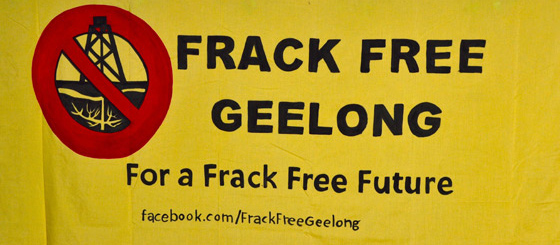
![]() More about fracking on this website: climatesafety.info/?tag=fracking
More about fracking on this website: climatesafety.info/?tag=fracking

